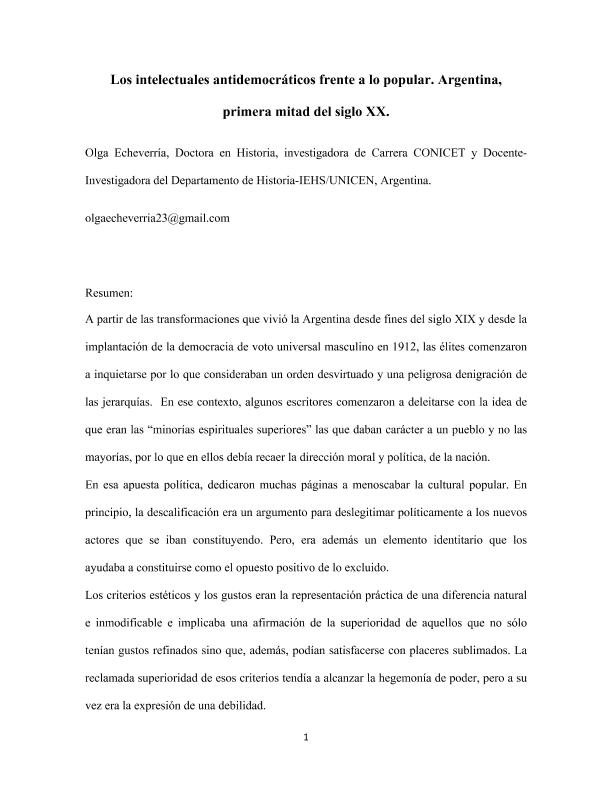Artículo
A partir de las transformaciones que vivió la Argentina desde fines del siglo XIX y desde la implantación de la democracia de voto universal masculino en 1912, las élites comenzaron a inquietarse por lo que consideraban un orden desvirtuado y una peligrosa denigración de las jerarquías. En ese contexto, algunos escritores comenzaron a deleitarse con la idea de que eran las ?minorías espirituales superiores? las que daban carácter a un pueblo y no las mayorías, por lo que en ellos debía recaer la dirección moral y política, de la nación. En esa apuesta política, dedicaron muchas páginas a menoscabar la cultural popular. En principio, la descalificación era un argumento para deslegitimar políticamente a los nuevos actores que se iban constituyendo. Pero, era además un elemento identitario que los ayudaba a constituirse como el opuesto positivo de lo excluido. Los criterios estéticos y los gustos eran la representación práctica de una diferencia natural e inmodificable e implicaba una afirmación de la superioridad de aquellos que no sólo tenían gustos refinados sino que, además, podían satisfacerse con placeres sublimados. La reclamada superioridad de esos criterios tendía a alcanzar la hegemonía de poder, pero a su vez era la expresión de una debilidad. After the transformations that Argentine suffered at the end of the XIX th. Century, and since the implantation of Democracy of masculine universal vote in 1912, the elites started to worried about what they considered a distorted order and a dangerous denigration of hierarchies. In this context, some writers begun to enjoy themselves with the idea of being the “spiritual superior minority”, capable to give character to the people and not to the majorities. In order to that, they considered that the moral and political direction of the Nation should be relapsed in them.
In the political gamble, they dedicated several pages to undermine the popular culture. At the beginning, this disqualification was an argument to politically discredit the new actors that were emerging. Also, it was a distinctive element that helped them to build themselves as the positive opposite of the excluded.
The aesthetic criteria and likes were the practical representation of a natural and unmodified difference, which implicated the affirmation of the elites superiority. That implicated both the refined likes and their capability to satisfy their superiority of such criteria. This tended to reach the power´s hegemony, at the time, it was a weakness expression.
Los intelectuales antidemocráticos frente a lo popular. Argentina, primera mitad del siglo XX
Fecha de publicación:
06/2013
Editorial:
Universidad del Valle
Revista:
Historia y Espacio
ISSN:
0120-4661
Idioma:
Español
Tipo de recurso:
Artículo publicado
Clasificación temática:
Resumen
Palabras clave:
Intelectuales
,
Autoritarismo
,
Cultura Popular
Archivos asociados
Licencia
Identificadores
Colecciones
Articulos(CCT - TANDIL)
Articulos de CTRO CIENTIFICO TECNOLOGICO CONICET - TANDIL
Articulos de CTRO CIENTIFICO TECNOLOGICO CONICET - TANDIL
Articulos(IGEHCS)
Articulos de INSTITUTO DE GEOGRAFIA, HISTORIA Y CS. SOCIALES
Articulos de INSTITUTO DE GEOGRAFIA, HISTORIA Y CS. SOCIALES
Citación
Echeverria, Olga Ines; Los intelectuales antidemocráticos frente a lo popular. Argentina, primera mitad del siglo XX; Universidad del Valle; Historia y Espacio; 40; 6-2013; 49-73
Compartir




